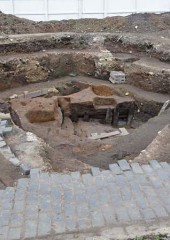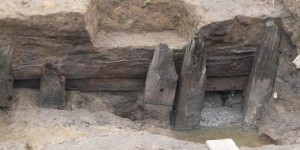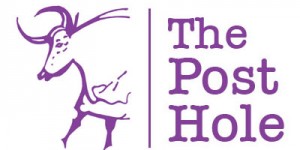- What is your job title?
I'm an aerial photography interpreter for an external company based at English Heritage. - What are your current projects?
I'm working on the North West Coast Rapid Coastal Assessment Survey - What first got you interested in Archaeology?
It was through a family interest in local history and Time Team when younger. - How did you get into the Archaeology careers field and your current job?
Firstly, through an Archaeological Sciences degree at Bradford. I was offered a postgraduate degree and, through personal connections like staff that I got on well with etc, forensic archaeology work with the police but turned both down for work in the field and joined a consultancy. I started work as a field archaeologist then became a CAD officer/illustrator. From that I got my present job. I got experience of working with aerial photography at university. - What kinds of experiences have got you where you are today?
I started with no knowledge of archaeology and ended up with a reputation and offers. Getting to know people and contacts with people in different fields has helped a great deal. I worked on 60-70 different sites and they all gave different experiences and understandings. In my opinion teaching is as important as learning and in many cases academics have little or no experience of work in the field or professional archaeological work, its all about the experiences you can offer to a given role. - What are some of the best parts about your job?
I don't officially work for English Heritage, but I like the real chance of being able to push myself further than in smaller companies of say ten people. There are also more experiences, and a chance to see more of the British landscape through the work. - And some of the worst parts?
I'm mainly office based and don't get the chance to get out in the field as much, which coming from a field background is a bit of a frustration. Like other jobs, it's also quite difficult to move up in and skills are not passed around as much as I'd like. - How much do you have to deal with members of the public?
I have no dealings with the public. I produce work that goes into the archive but as the work is produced for academics it doesn't enter into the public dominion. - How do you feel about the present levels of computerisation in archaeology?
More computerisation is coming through and than can only be an excellent thing. Computerisation is generally more accurate. However in things like illustration reductions, errors are increased. So for some parts of archaeology, like small illustrations, the old methods are the best, but for things like site plans computerisation should be taken all the way. For some of the older techniques in archaeology there isn't much more to learn, but with computers and computerisation there are always new things to be learnt, which can only be a benefit to the field. - What are your experiences with conventions, especially those which are usually taught in university departments, such as drawing conventions?
I worked on sites with many different companies and some refused to use conventions. I think conventions should be based on a MOLAS style system but implemented on a field scale. However, there are many different sets of conventions and teaching these in academic departments can be good for diversity and understanding. - How do you see the current Archaeological climate in this country in terms of jobs?
I think its getting stronger on the research side, and will do until the country has been covered. The consultancy side of Archaeology is dying out, I think, as consultancies are becoming more willing to pay fines than to pay the fees for archaeological work. This means that the smaller companies are suffering. - What advice do you have for students wishing to go into a job in Archaeology?
Learn from your experiences and listen to and take in what people tell you. Field archaeology jobs are relatively easy to get into straight from a degree but for academic jobs its worthwhile pushing to get different experiences, even if you wouldn't normally think of them. Volunteering is always useful. Do more than the compulsory fieldwork; that shows the drive that employers like. - What are your experiences of job interviews?
I went for the same job twice before I was offered my current position, and both times failed on the stereoscopic vision test. The third time I wore contact lenses and was the only one out of the seven candidates who got100%. The selection process was a basic interview followed by the photography test, but every job is different. - Do you have any interview technique tips?
One of the keys things is posture. Don't slouch, but adopt a semi-relaxed stance. Ask yourself the question 'where do you see yourself in the future' as employers like to know and it's best to be prepared. It's essential to be able to work both by your self and in a team.
With gracious thanks to our interviewee.





